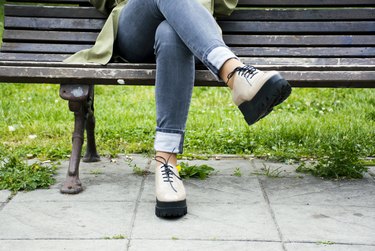
Do you have hip pain or outer and inner thigh pain when crossing your legs? If crossing your legs causes you to feel the most discomfort in your hip and thigh region, this position may be making an existing problem worse.
But whether an overreliance on the crossed-leg posture is causing strain on your muscles or joints or an underlying condition makes itself most known in this position, your doctor can help you pinpoint exactly why your flare-ups are happening. Most important, you can begin to treat it.
Video of the Day
Video of the Day
Is Sciatica the Culprit?
If you habitually sit with one leg crossed over the other, especially if it's the same leg position rather than alternating, you're placing continuous pressure on your hip joint and sacroiliac joint. When those joints are compressed for too long, it results in numbness and pain. If your hip or groin pain when crossing your legs is mostly on one side, this symptom points to sciatica.
While that pressure can also make itself known when you're standing or sitting in other positions, it's not surprising that sciatica often flares up when you reposition yourself in the crossed-leg position. You may feel a mild ache, a burning sensation or "pins and needles" and numbness.
Extra weight can make sciatica worse. If you suspect this is the case, adjusting your diet and starting low-impact workouts can help address the extra pressure. In addition, your doctor will advise you about which anti-inflammatory medications, physical therapy or steroid injections may work in your situation. In extreme cases, surgery may be needed.
Testing for Tendinitis
If you have outer hip and butt muscle pain when you cross your legs, tendinitis may be the cause. This particular inflammation problem often occurs when a tendon is overworked, often because of muscle imbalance. Hip pain when crossing your legs is one example of one side's muscles working harder than the other.
It's important to consult your doctor if you suspect tendinitis, because letting it go untreated can lead to tendon rupture. Your doctor can diagnose the problem through X-rays or even a simple physical examination. She can also tell you what activities to avoid with tendinitis.
Physical therapy can help you cope with thigh, hip and butt muscle pain when you cross your legs by showing you sitting positions that will distribute your weight more evenly. In addition, physical therapy helps build flexibility and strength to ease tendinitis.
If your pain doesn't go away with posture readjustment and physical therapy, a steroid injection or dry needling treatment may help, as can surgery or ultrasonic treatment.
Hip and Butt Muscle Pain
If the bursa sacs in your hip and outer thigh region become inflamed, you may feel the pain most when you cross your legs, because pressure tends to irritate the bursa sacs. A specific kind of hip bursitis known as trochanteric bursitis, causes hip and butt muscle pain. Another clue that the problem is bursitis is if the area looks red or swollen. A physical exam or X-rays will confirm bursitis. Of course, if you have inner thigh pain when crossing your legs, hip bursitis is more unlikely.
To deal with the pain of hip bursitis, learn to sit in a position that takes pressure off the affected area. In particular, don't cross your legs. Icing your outer thigh and hip can also help, along with over-the-counter anti-inflammatory medications. If that doesn't help, consider physical therapy or steroid injections for hip bursitis.
For at-home exercises that can strengthen the area and reduce pain, consider wall squats, bridge moves, pelvic dips and standing on one leg. Sleeping with a pillow between your legs may also help.
Is this an emergency? If you are experiencing serious medical symptoms, please see the National Library of Medicine’s list of signs you need emergency medical attention or call 911.